The city may have been a little late to China’s craft-beer party but, with brew bars popping up all over, it’s catching up fast.
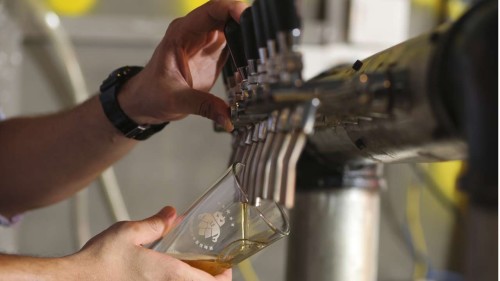
In July, Shenzhen independent craft brewery Bionic Brew celebrated its second anniversary. A horde of thirsty expats and local beer enthusiasts descended on Bionics’ tiny backstreet bar to listen to live music and down made-in-Shenzhen lagers, ales, stouts and pilsners, as well as a commemorative pink ale, created by master brewer Dmitrii Gribov.
Although American owner Joe Finkenbinder recalls little of the evening, what his hangover cannot obscure is that he, above all others, has succeeded in fermenting a Shenzhen beerscape. And when one winds the clock back, it becomes apparent that it took far more than yeast, hops and malt to turn this mercantile migrant town on to a quality brew.
A decade or so ago, dingy discotheques catering to horny Hong Kong weekenders and expat dives populated by boozy traders defined Shenzhen’s nightlife. As with most industries in boom-time China, the restaurant and bar scene evolved at a frenetic pace, with venues closing as often as they opened. Gradually, a more respectable bar and club culture evolved. International concepts of interior decor were assimilated to suit local mores while Western pop supplanted Canto-karaoke-ballads as bar owners tended to the young population’s internationalist pretensions.
But much of the “progress” the bar owners trumpeted was superficial, as gilded and vacuous as the indistinguishable shopping malls being thrown up across the city. Every new bar vied to become more elaborate than the last. But a lick of bright paint, all-day happy hours and a booming sound system could not gloss over an abiding lack of soul. Despite the mushrooming scene of foreign bar bands, most punters still necked mass-produced lager to the soundtrack of tumblers rattling through night-long campaigns of liar dice.
There were, of course, exceptions. Frankie’s Bar & Grille, though not a brewpub, became an early proponent of craft beer. A few luxury hotels employed European brew masters to produce beer in-house. Yet, for the most part, Western-style pubs simply hawked pricey foreign beer to a nouveau-riche clientele for whom the consumption of foreign products won them face. In many cases, they’d supplanted a Chinese mass-produced lager with a Western one, and were paying handsomely for the privilege.
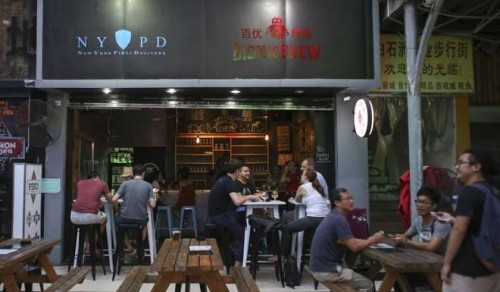
Enter Michael Mo Haifeng, who, in 2005, came to Shenzhen from Guangxi province armed with an English degree. Mo initially worked in marketing but found his calling at the most unexpected of meetings.
“I met an Australian taxi driver who was married to a Chinese woman who came to visit her family in Shenzhen,” Mo says. “I was invited along because I speak a little English.
“[The Australian] told me he could make beer. This sparked an interest. So, afterwards, I joined an online forum of home brewers in China and someone recommended I read the book Get Your Own Brew, by Gao Yan.”
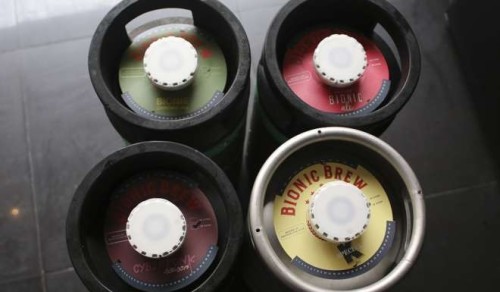
Inspired by the pioneering Chinese-language manual, Mo began experimenting at home.
“When I made my first batch, I was very nervous. I had to wait a month for it to ferment,” Mo says. “It was like meeting a beautiful girl and then having to wait ages for a date. But it was worth it. I had a great sense of satisfaction when I tried my first beer.”
Soon afterwards Mo partnered with a local businessman who had a bar on Wutong Mountain, a national park in Luohu district that is the source of much of Hong Kong’s drinking water.
“I was the first Chinese person to gravitate from home brewer to professional craft-beer maker in Shenzhen,” proclaims Mo, proudly.
Due to personal differences, however, that partnership proved short-lived.
In 2013, Mo moved his operation to the backyard of Home Café, a small eatery owned by his girlfriend, also located on Wutong Mountain. Situated next to a stream, the property provided access to a ready supply of clean water as well as the space to experiment. Mo came up with a brand name, Little Mill, and printed his own labels. Although he was able to produce only enough to stock his girlfriend’s fridge, cater for the occasional commercial event or barter favours from friends, his beer wasn’t half bad.
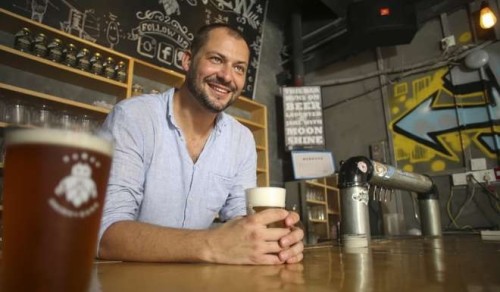
Eventually Home Café was closed, due to difficulties with the landlord, and Mo’s ambitions to start a brew bar were again thwarted.
In his 2014 book The Craft Beer Revolution, Steve Hindy documents the rise of the industry in the United States and gives examples of many pioneers who never quite made it. As Hindy notes, “In the mid-1970s, there were fewer than forty breweries in America; today there are more than 2,500 and another thousand are in the works.”
There are many parallels to be drawn between the situation in America in the mid-20th century and 21st-century China. The American beer industry, after prohibition, which ended in 1933, was fast dominated by what Hindy describes as “mass-producing multinational brewers who make beer the way Kraft makes cheese or Hershey makes chocolate”.
For Europeans, particularly those from great brewing nations such Britain, Belgium and Germany, the potent image of American blue-collar workers perched on bar stools sipping Bud, Miller or Coors implied that crossing the Atlantic somehow damaged your taste buds. But this conclusion ignored the circumstances that had cultivated the conglomerates.
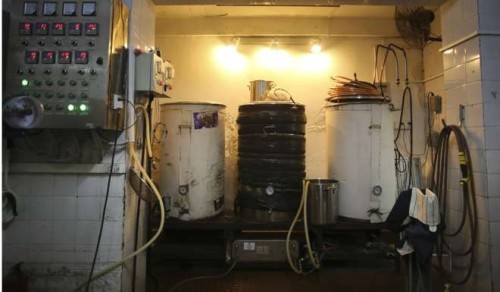
After a clique of American beer drinkers had sampled European beer they made it their raison d’etre to turn the tables in what Hindy dubs, “a quest by a band of Davids to bring down the Goliaths”. These craft brewers, exhibiting a DIY, punk-rock-type ethic, gradually gained ground on the big breweries, proving that independence, community and quality do matter to consumers.
A few giants similarly commanded post-reform-era China’s beer market. Many of these companies had foreign roots: Harbin Beer was established by a Russian, and the British and Germans founded Tsingtao. But these breweries were nationalised after the 1949 revolution and, by the time China adopted its open-door policy, in the 1980s, cheap, insipid lager had become the mainstay of the masses.
American craft beer eventually began to flood the market, as expats who home-brewed turned their hobbies into full-time jobs. Boxing Cat Brewery, in Shanghai, became, arguably, the mainland’s first successful craft-beer producer (although there are many contenders to this throne), but it was in Beijing that craft culture first bloomed. The capital was already home to a rock ’n’ roll culture,paving the way for pioneering breweries such as Slow Boat and Great Leap, which soon became part of the city’s F&B lexicon.
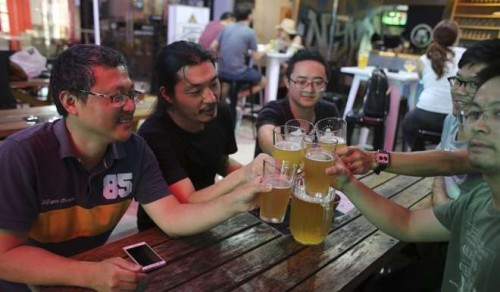
While enthusiasts in other first- and second-tier towns followed suit, Shenzhen stagnated. Economic miracle it may have been but bastion of the breweries it was not. Only a few craft-beer geeks in the expat hubs made anything worth drinking, usually distributed to their friends at parties. Or from a keg in the park outside Pizza Hut in Nanshan district’s Ecological Square, as Finkenbinder was doing in 2014.
Finkenbinder, however, had already established a craft-brew bar, Bionic Brew, in Baishizhou – a crumbling urban village where most migrants make landfall in the city. Unfortunately, the bar drew the ire of the area’s residents (many of whom worked long hours and were accustomed to early nights) and had to be closed down.
“We were too different, too loud,” says Finkenbinder. “The first brewery and bar was down an unassuming alley in one of the poorest parts of Shenzhen, and just down the road from a police dorm. There was nothing like us around and probably never will be after our ordeal. I was given the option to stay open if I signed the business over to a local partner and went to dinner with a government guy. Since I’m on my own, without any partners, and don’t believe in paying bribes, I chose to move locations.
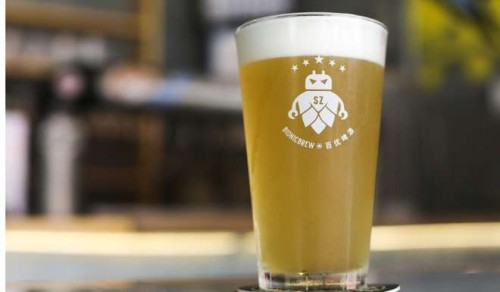
“During the few months between closing bar one and opening bar two we threw parties in parks and partnered with underground venues. Until we found a new [legitimate] venue, we blackened out all the windows and brewed in the middle of the night. It was rough brewing beer from 10pm to 6am and then trying to sell beer out of a taxi during the day, but we made it work. Occasionally, we’d have people come by the bar with a special knock and have quiet get-togethers with friends, kind of like a speakeasy during prohibition.
“It felt like we were being hunted but we were always one step ahead of the authorities.”
Finkenbinder’s second bar was also in Baishizhou and tucked away down an alley. But noise complaints and the suspicion aroused by foreigners congregating in large groups in a back lane inevitably led to the second Bionic Brew suffering the same fate as the first, closing after only three months.
“We didn’t break any laws, we had the right paperwork, but in China, and especially Baishizhou, they can shut you down like that,” he says, clicking his fingers.
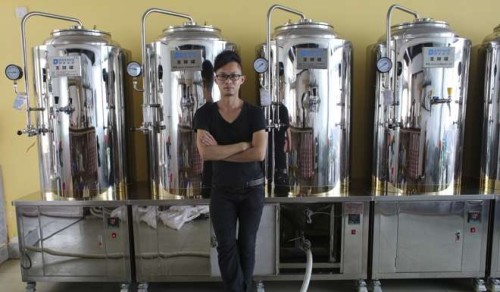
In a city fast gentrifying, with new bar streets and commercial plazas aplenty, why is Finkenbinder so determined to run a business in an urban village? Baishizhou is not without its gritty charms – the low hanging electricity cables, wet markets and open-front stores offering a porthole into a Shenzhen past – but it is one of the most lawless and chaotic areas in the city.
“Firstly, Baishizhou’s cheap,” Finkenbinder says. “If I had to pay high rent, I’d have to charge more for my beer, and that’s not what I want to do.”
His beers average about 35 yuan (HK$40) a pint, highly affordable when one considers a Guinness in the central business district sells for more than twice that.
“Secondly, Baishizhou is where people first touch down in the city; it has a starter feel to it, which reflects my situation.”
Finkenbinder dubs himself an “army brat”, who called Kansas, Alabama, North Carolina, Pennsylvania and Germany home during his youth.
“I grew up for a time in a trailer in Alabama. I was a poor kid. To me beer is a blue-collar product. It shouldn’t be something the everyday man can’t afford. And it should relate to the place it’s made in.”
Finkenbinder’s journey to Shenzhen also tells us something of how he developed the tenacity to make a brew bar successful in the most unlikely of places. After a stint as a paratrooper, and four years at university, Finkenbinder hit the road.
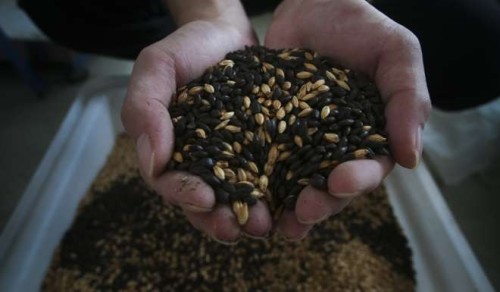
“I’ve been to over 40 countries,” he says of his coming-of-age tour. “I did volunteer work, taught English, brewed beer, went scuba diving and partied my way around the globe.”
He first touched down in China in 2006, finding his way to Beijing, where he pulled pints at Great Leap Brewing.
“That’s where I met Cody,” he says.
Canadian Cody Fuiten, himself a veteran of China’s craft-beer industry and a well of information on the topic, has since become Bionic’s bar manager.
The seeds of a business were sown in the capital, says Finkenbinder, “Beijing is the intersection of politics, education and tourism, it has a huge foreign presence so craft beer naturally took off there. But the scene was a little saturated, plus the pollution is really serious.
“I thought about Chengdu, Kunming and Shenzhen. But what swayed me was that Shenzhen is near Hong Kong, so I could establish a good supply chain, and get the right ingredients and tools for the job.”
After the second Bionic Brew bar met its unhappy fate, Finkenbinder appealed to the police, asking them to suggest where he should set up shop. He was pointed towards a Baishizhou food street on the edge of the labyrinthine slum, a spot that is a little less left-of-field than Finkenbinder might have liked, but it appears that Bionic Brew is now thriving.
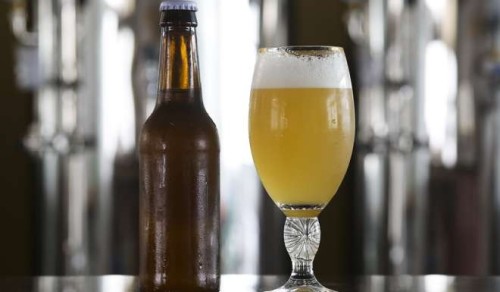
Bionic Brew supplies several bars in the city and, last year, Finkenbinder staged the inaugural Shenzhen Beer Festival.
“We invited some great local bands as well as Slow Boat, Hong Kong Beer Co, Young Master Ales and Strand Brewing, from Guangzhou.”
This year, Finkenbinder is planning an even bigger festival, scheduled for November.
“I want at least 12 brewers. In order to be invited to the festival, the beer must be made with Chinese water [Hong Kong, Macau and Taiwan included]. I believe that’s the best way for us to promote local craft beer.”
This sense of camaraderie seems integral to Finkenbinder’s business ethic. Peko, for instance, a brewpub that specialises in Shenzhen-made cider, was invited by the American to go into business right next door.
“Hoss Preheim [Peko’s owner] … helped me get started by renting equipment to me, so, when I opened up our third location and we saw we had extra space, I sublet him the shop so he could set up his own taproom.”
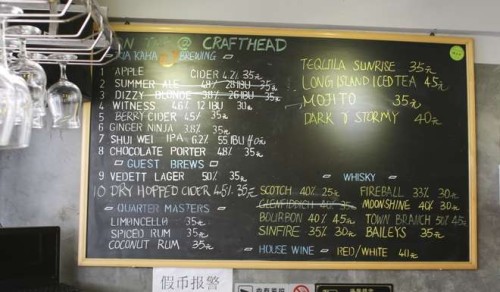
In 2012, Preheim, an American from California, had left his job as a factory manager in Guangdong, rented an apartment in Shenzhen and started brewing beer with the idea of selling wholesale.
“It was basically home brew, 150 litres a batch, which places like Frankie’s Bar would sell for me,” he says. “When Joe came down from Beijing, he was asking people about craft-beer equipment and someone pointed him to me.
“Camaraderie is something quite unique among brewers,” Preheim says. “I was at Joe’s beer festival last year and will be again this year. It’s an opportunity to educate people and build a network.”
Craft Head, located in Shuiwei, another mottled urban village, was opened just a few months after Bionic Brew, by New Zealander Nicholas Clark, an enthusiast who’d grown tired of working as a business development manager in Shenzhen.
Over a delicious Coconut Chocolate Porter, Clark describes the close relationship he shares with fellow craft brewers in the city.
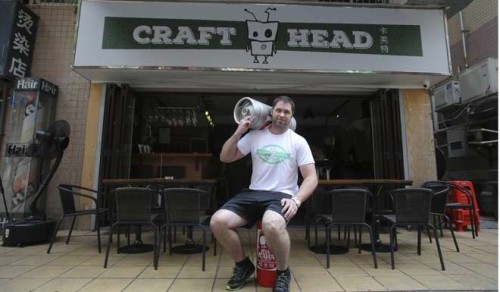
“It’s the craft mentality,” he says. “I’ve lent ingredients to almost all the brewers in Shenzhen at one time or another. Joe sold my beer in Bionic before I’d opened up and we’re talking about doing a taps takeover in the future, whereby I’ll sell his beer and he’ll sell mine for a night.”
Over in Nanshan’s flashy microbrewery Taps, there’s evidence that Shenzhen brewers are looking upmarket. Indeed, the voguish space wouldn’t look out of place in a hip New York neighbourhood. Co-owners Daniel Dumbrill, a Canadian, and Briton Gavin Hemple had initially considered establishing a brewery in Hong Kong.
“I had a friend in Boxing Cat, in Shanghai, and was aware of the challenges of establishing a microbrewery in mainland China,” says Hemple, a self-confessed beer geek who has been brewing for years in the country’s south. But with the Shenzhen craft-beer revolution in full swing, finding a space north of the border was clearly a no-brainer. Finkenbinder helped here, too, by recommending a designer and, a year on, Taps’ “more elevated, less urban” approach is wooing white-collar workers, leading to plans to open up in Coco Park, Shenzhen’s answer to Lan Kwai Fong.
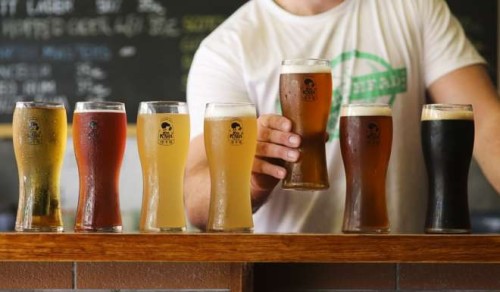
Later, I catch up with Mo in an industrial zone in Longhua New District, where he and fellow craft enthusiasts Zhou Chuanlong and Li Hui are busy brewing.
“I came to this factory to see the equipment they manufacture and the boss said I could use these tanks for free,” Mo says, before offering me a sample. “This is a wheat beer.”
Mo now sells beer online, although he still dreams of owning a brewpub one day. “I have Wutong Mountain water,” he says, of his key ingredient.
We go on to sample his delicious lager and pale ale.
“I really don’t care about Beijing or Shanghai. Shenzhen will forge its own path,” he says. “There’s already great curiosity about quality beer trickling into the city but it’s not quite a river yet. But remember, this city is big and young and progressive, so the potential is boundless.”
Shenzhen might still be thought of by many Hongkongers as a seedy border town, but there’s something brewing beyond the backstreet back-rubs and fake Burberry bags. And, what’s more, like most things north of the border, it’ll very probably ferment fast.

